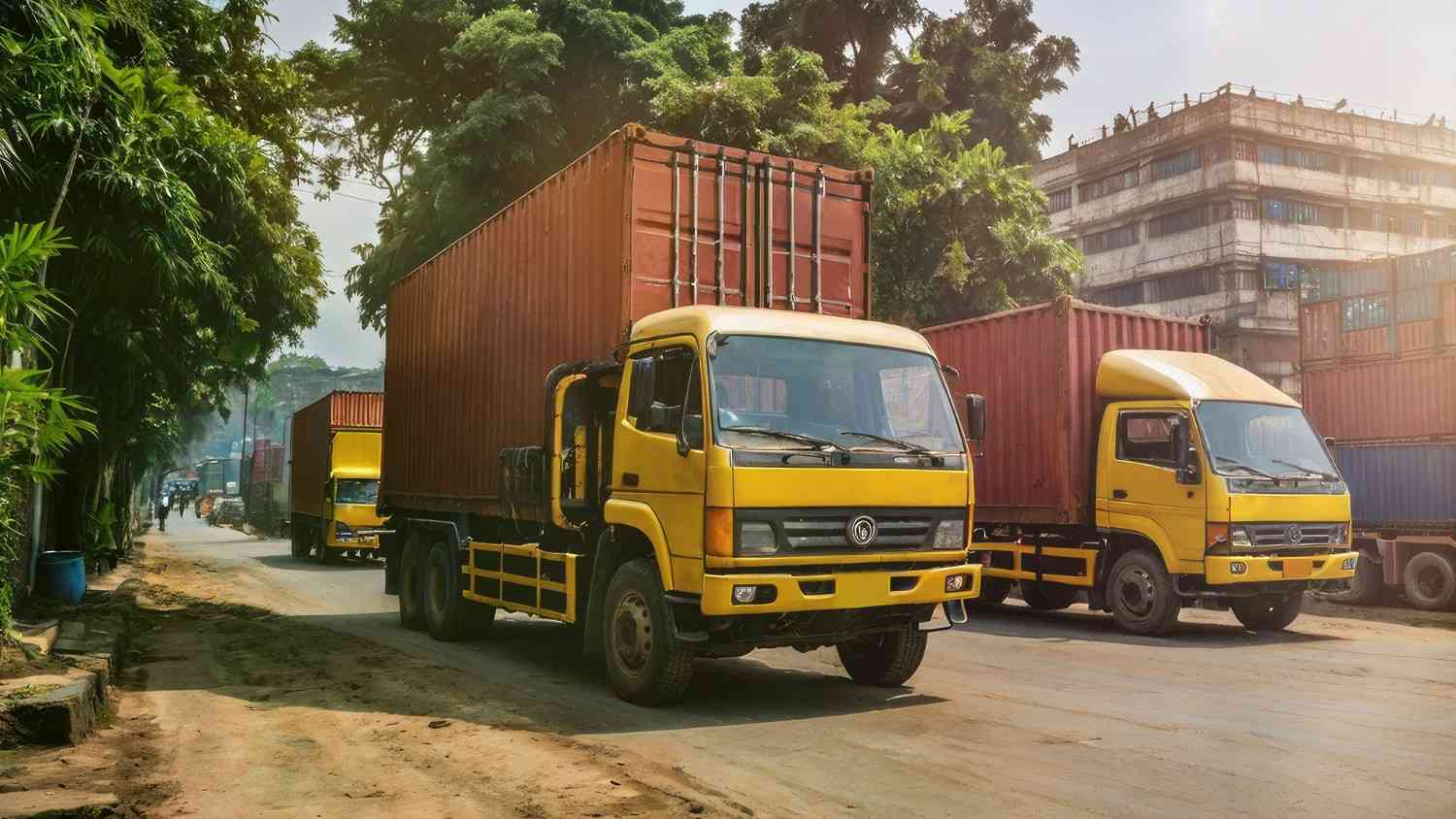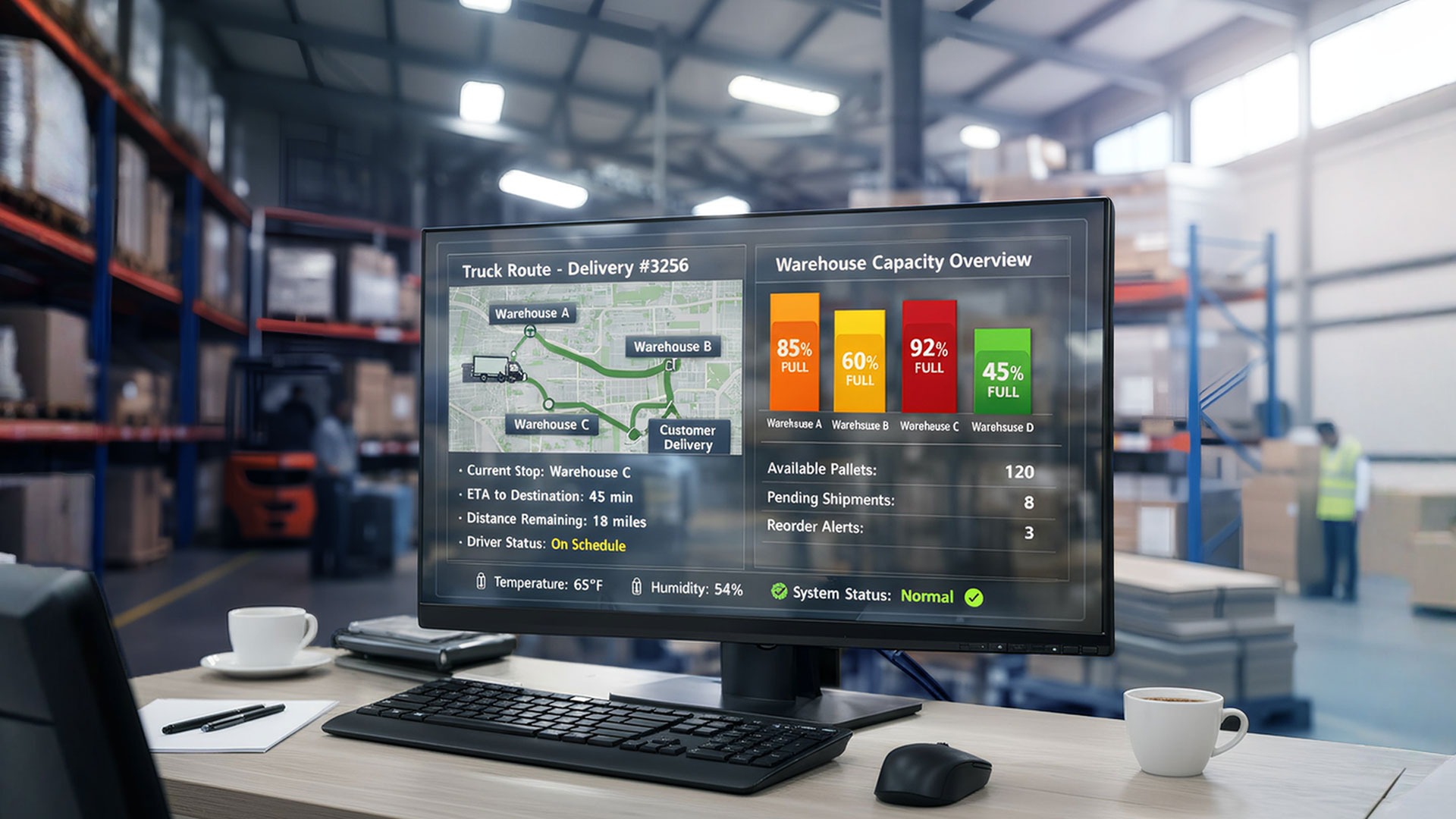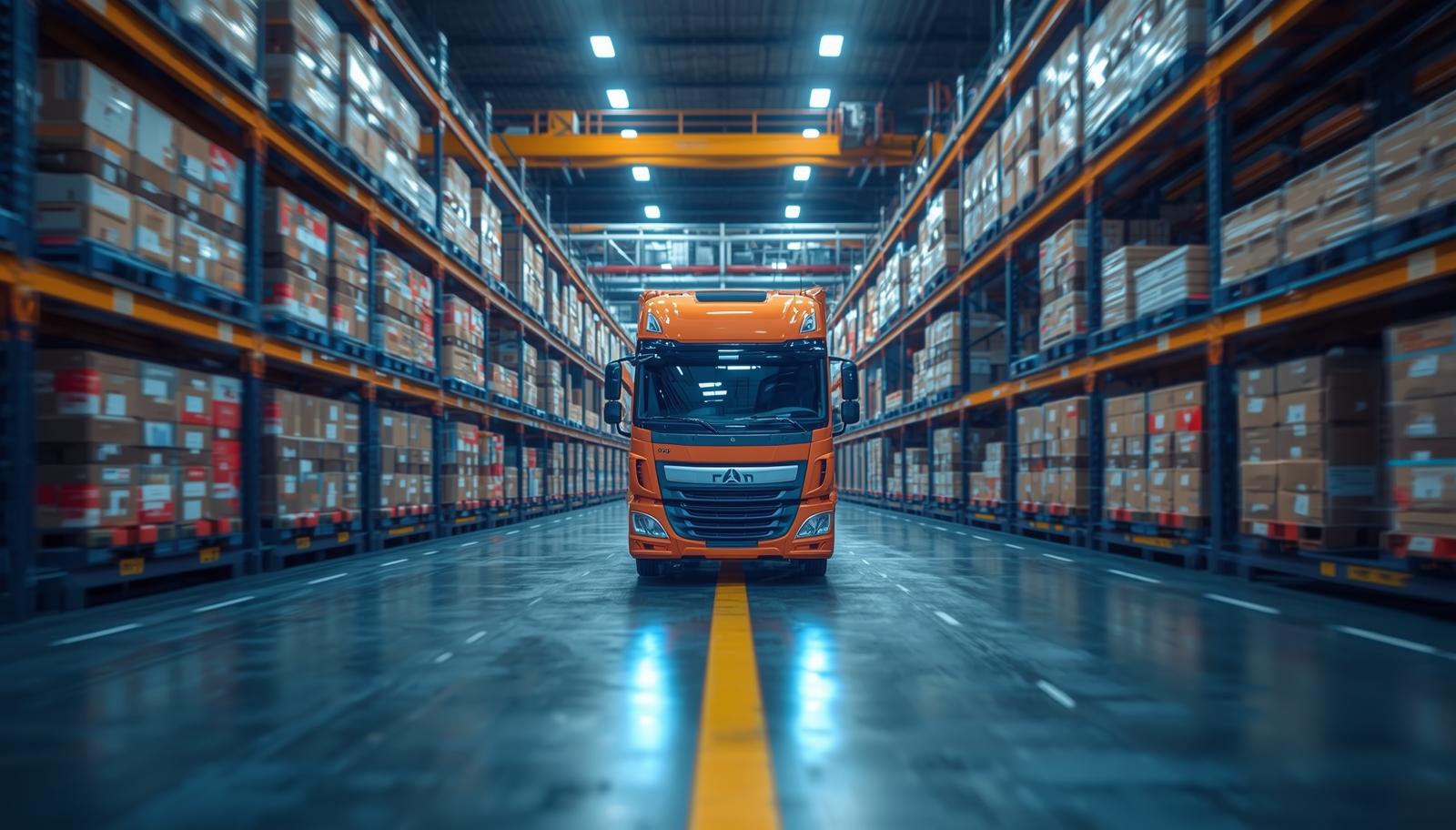
Over the last few years, there has been a substantial transformation in Bangladesh’s transportation and logistics industry, with the rise in on-demand trucking services. Being overcrowded with cities and having an impressive export-oriented economy which is growing constantly, Bangladesh is now changing its logistics system to satisfy the rising need for effective, trustworthy, and low-cost transportation services. The revolution in technology has given rise to many services, one of the coolest of them all being on-demand trucking, which has impacted every business, manufacturer, and consumer.
It is essential to note that in this blog post, we will focus on some aspects of the on-demand trucking industry as one of the components of logistics in Bangladesh and its economy in general, its evolution, the reason for this evolution, and what kind of businesses people can expect there.
What is On-Demand Trucking?
In the on-demand trucking system, shippers, businesses, and individuals have the option to book trucks for goods transportation as and when required. Think of it as called a cab, only this time for intercity delivery of goods. Companies do not have to invest in trucks and get involved in lengthy contracts with transport agencies; they can simply make a call to request a truck, mostly via an app or a web tool.
This idea has transformed trucking in many countries across the globe, and now, Bangladesh is also riding along the same trend.
Why On-Demand Trucking Matters for Bangladesh?
The textile and garment sector is the main propulsion of Bangladesh’s economy, which brings about a great change for Bangladesh. In addition, this country is one of the most distinguished nations in exporting fish and fish products. Clearly, with active industries and commerce taking place, transportation and logistics become vital in ensuring competitiveness and efficient movement of goods to and within the markets.
Challenges have been there in the traditional trucking business in Bangladesh for quite some time now. The most common issues include delays, high prices, and unavailability of information. These can affect operations and result in losses due to extended periods of waiting for production and deliveries, as well as increased costs associated with doing business. Instead of waiting for days for a truck to be loaded, on-demand trucking opts for a faster and more cost-effective method boosting transparency in its operations and saving up to 20% of business costs.
But how is this possible? Let’s take a look at some of the key reasons why on-demand trucking has become transformative.
1. Technology-Driven Solutions
On-demand trucking service is largely driven by technology. Nowadays, shippers and truck owners can be connected through applications and online sources in a flash. This prompts the need for a truck to be sourced in a more effective and fast manner. Companies do not have to waste time and look for free means of transport; they simply book and monitor trucks on phones in a few seconds.
Trucks embedded with GPS also provide possibilities of in transit visibility where both the business and the driver are able to get current status. This level of visibility encourages on-time delivery of goods since any anticipated delays can be reported instantly so that the concerned party can make the necessary arrangements whether to wait or reschedule.
All thanks to the use of smartphones and mobile applications, the level of paperwork has decreased considerably leading to smoother flow in the whole process.
2. Maximizing Cost Efficiency in Trucking Operations
For a lot of Bangladeshi businesses, transporting goods accounts for the bigger chunk of their expenditures. Companies have had to cave under the pressure of long term contracts with conventional trucking, most of the time even reserving for trucks they do not need. With on-demand trucking, businesses do not have to be confined. These days, businesses are able to hire trucks whenever they want, hence minimizing the cost of transport.
Also, with the use of technology, shippers can make surveys on the prices offered by different truck operators and take the cheapest one. The presence of such competition among the trucking companies contributes to better rates and services for the shippers.
Most of the entrepreneurs dwelling in Bangladesh’s economy, particularly small businesses, appreciate this advantage greatly, allowing them to grow their businesses faster and more comfortably without bearing high logistics costs.
3. Enhancing Reach to Remote Areas with On-Demand Trucking
Bangladesh’s logistics sector struggles with accessibility to distant & rural areas – perhaps the major challenge. Conventional trucking services do not reach such areas or the charges are exorbitant. On the other hand, with on-demand trucking applications, shippers can go to the country’s extreme corners.
This provides an inexpensive and effective answer for businesses that have to move goods to the countryside. Be it timely trucking of agricultural produce, textiles, or packing raw materials. Such improved connectivity also tends to encourage intra-country trade which in turn assists the regions’ local economies and small entrepreneurship.
4. Reducing Environmental Impact Through Sustainable Trucking
The vast majority of environmental concerns about logistics can be put in an environmentally friendly way by the example of on-demand trucking. By optimizing truck trajectories and filling the cargo space before leaving, the number of truck runs needed to relocate the cargo is reduced. This aids in decreasing the amount of fuel used and lowering the carbon footprint in the distribution processes making them more environmentally friendly.
Logistics faced with the challenge of decluttering and still do not wish to damage the environment would view the same as a perfect chance to marry their logistics strategies with the company’s green objectives.
Key Trends Fueling the Rise of On-Demand Trucking in Bangladesh
In the course of these advancements, on-demand trucking has begun to establish itself in the economy of Bangladesh due to certain factors that are responsible for its growth. Let us explore these factors further to understand their effect on the industry.

1. Digital Transformation in Logistics
The logistics sector in Bangladesh is changing with the help of advanced technology. Many trucking companies are starting to distance themselves from old techniques of running business and are beginning to adopt digital systems. This however has been possible due to the increased penetration of smart devices, better internet access, and the need for higher levels of service delivery.
These on-demand trucking platforms have developed an environment in which, truckers register, shippers order services, and all the parties involved track the shipment within the stipulated time frame. The increasing confidence in such platforms is pushing more corporates and truck drivers to the internet creating stiff competition and enhanced service delivery.
2. Increased E-commerce Activities
The growth of e-commerce in Bangladesh has brought about a proportional increase in the demand for logistics and transportation services. The expansion of online shopping platforms such as Daraz, Evaly, and AjkerDeal calls for efficient delivery services throughout the country. Last Mile Delivery service comes in handy for e-commerce players, and on-demand trucking platforms enable businessmen to deliver within the scheduled time.
Reaching out to consumers who want fast and dependable deliveries has put a strain on logistics providers and on-demand trucking is just what they need.
3. Urbanization and Infrastructure Development
Bangladesh is transforming into a completely urban country at an exorbitant rate. Rapid development is observed in cities such as Dhaka, Chattogram, and Khulna resulting in the increasing demand for efficient and effective modes of transportation for the importation and exportation of goods to and from these urban centers. Due to enhanced investments towards infrastructural growth by the government, the building of new roads, highways, and bridges, trucking on demand is becoming easier and more attractive.
When infrastructure improves, trucks can now move faster and cover greater geographical areas within a short period of time, thus making on-demand trucking even more relevant and efficient than before.
4. Growth in the SME Sector
The contribution of Small and Medium Enterprises (SMEs) to Bangladesh’s economy is noticeable, especially in the textile, agricultural, and manufacturing processes. These businesses often call for logistics actions that are more relaxed and on-demand trucking is one such option. Be it moving raw materials or finished goods to customers, SMEs have been on the rise to properly outsourcing on demand trucking services due to their flexibility and affordable nature.
5. Government Initiatives
The government of Bangladesh has shown a great commitment to improving the logistics of all the regions in the country to promote economic growth. Development of economic zones and investment in port facilities are some of the initiatives that are increasing the demand for trucking services. The government’s push for digitalization and tech-driven solutions across industries is further propelling the belief in on-demand trucking platforms.
As these initiatives come into full bloom, we can bet on the rise of on-demand trucking to an extent more than it already exists where more industries will come to appreciate the ability it comes with.
Opportunities for Entrepreneurs and Investors
On-demand trucking services development in Bangladesh creates immense potential for entrepreneurs and investors eyeing the logistics market. Below are several ways in which you can participate:
1. Building Digital Platforms
An opportunity exists to develop and enhance digital platforms for connecting shippers and truckers. Though several players are already in operation in this environment, it remains in its infancy. There is room for entrepreneurs to come up with more superior, cutting-edge platforms or enhance the existing ones through route optimization, use of predictive analysis, provision of insurance cover, etc.
2. Investing in Truck Fleets
There exists a huge potential in the truck ownership investment market. Given the trajectory of the on-demand services growth, truck operators will be required to have more trucks to keep pace with the demand. Investing in a fleet of trucks and combining efforts with on-demand platforms is bound to generate consistent returns.
3. Logistics as a Service
As more companies tend to outsource their logistics services, the demand for third party logistics (3PL) providers is on the increase. Entrepreneurs can avail of logistics services that not only deal with transportation but also warehousing, packaging, and inventory management giving businesses a complete logistics package.
4. Training and Upskilling Drivers
In Bangladesh’s logistics industry, there is a persistent problem of a shortage of qualified truck drivers. There exists a potential for establishing training centers for professional drivers that would offer multiple trainings and certifications, including defensive driving, goods handling, and driving of GPS containers. This would not only enhance the standards of the logistics industry but also aid in reducing road accidents and improving the quality of services.
5. Sustainability and Green Logistics
Over the years, there has been a growing emphasis on sustainability for all sectors, and this includes logistics. Business people, on the other hand, may venture into green logistics, which could include services such as the provision of electric trucks, bike couriers, routing systems for optimization of fuel costs, and more. It is likely to draw in companies that seek to lessen their operational effects on the environment and customers who care about such things.
Challenges Impacting the Growth of On-Demand Trucking in Bangladesh
The potential opportunities existing in Bangladesh’s market for on demand trucking services are many but important obstacles must first be resolved for the associated industry to thrive. Some of these challenges include:
- Bad Roads: Even though there has been some progress in this aspect, some of the roads in the rural areas are still in bad shape causing delays in deliveries as well as excessive wear and tear of the vehicles.
- Inability To Comply With Regulations: Understanding the networks of regulations within which the trucking and logistics business operates in Bangladesh is quite challenging. Entrepreneurs need to pay great attention to risks associated with licensing, permits, and taxes.
- Cost Of Fuel: The success of on demand trucking services is often threatened by changes in the prices of fuel. Fuel coca efficiency will also have to be ensured for the businesses to manage better fuel costs and this may include using fuel efficient trucks, better route planning or even going as far as electric trucks in the future.
- Insufficient Number Of Drivers: The need for trucking services has increased over the past few years, which in turn has created the demand for drivers as well. Unfortunately, in Bangladesh, there are not many qualified drivers available. This lack of education and training for drivers restricts the on demand trucking services and their growth from occurring. In this case, the company will have to find ways of recruiting and developing drivers.
- Skepticism and Participation: Even though current times are characterized by rapid technological development, not all enterprises and carriers are eager to switch to modernized approaches. Trust among potential users of on-demand lorry services will be necessary if such services are to be made popular. They will have to guarantee transparency, dependability, and safety to win the trust of the users and the truck drivers.
The Future of On-Demand Trucking in Bangladesh
- Increased Digitization Across the Supply Chain
- Artificial Intelligence and Machine Learning
- Blockchain for Transparency
- Electric and Autonomous Trucks
- Expansion Beyond Borders
Conclusion
This latest trend of on-demand trucking in Bangladesh is not just a trend, it is a total revolution in logistics management all over the country. On-demand trucking might prove as one of the decisive factors in revolutionizing the logistics infrastructure in the nation of Bangladesh, considering the nature of business it is an affordable, adaptable, and efficient means of transport.
For a regular business, adopting this change of pace is not an option; it is essential in order to keep pace with the world which is becoming more and more dynamic by the day. It does not matter if you are a small scale manufacturer or a big time exporter, and if you call upon on-demand trucking services, you will manage costs more effectively, speed up deliveries and better serve your customers.
Businesspeople and financiers can easily make the most of this developing economy. It comes with all sorts of opportunities; building digital application systems, putting lots of vehicles on the road, and teaching individuals how to drive trucks, etc. Nevertheless, there are some visible hurdles but those who wish to make money from the on-demand trucking upsurge need to think about such obstacles, demography wise.
How Can Wahyd Logistics Help?
With extensive expertise in logistics and a long list of satisfied customers, Wahyd Logistics is committed to providing seamless services tailored to your business needs.
We offer hassle-free, customized logistics solutions, allowing you to focus on growing your business while we handle the complexities.
Contact our logistics experts today, and we’ll be happy to assist with all your logistics needs.






